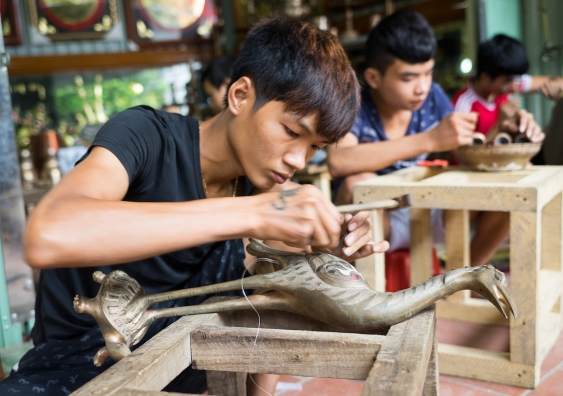Protection vs empowerment in the UN Convention on the Rights of the Child
Australian Journal of Human Rights Andrea Durbach prize-winner explores a new framework, giving more weight to children’s voices while facilitating their journey in life.
Australian Journal of Human Rights Andrea Durbach prize-winner explores a new framework, giving more weight to children’s voices while facilitating their journey in life.

Belinda Henwood
UNSW Media & Content
0432 307 880
b.henwood@unsw.edu.au
On Wednesday 30 October, UNSW Law’s Dr Noam Peleg was awarded the Australian Journal of Human Rights Andrea Durbach Prize 2018 for his article ‘Illusion of Inclusion: challenging universalistic conceptions in international children’s rights law’.
The Andrea Durbach Prize is awarded annually to an author or authors whose original article in the Australian Journal of Human Rights reflects the values that have resonated in Professor Durbach’s career and scholarship. These include: the courage to push the boundaries of human rights debates; the creativity to examine issues that cut across different academic disciplines; and a desire to press for human rights accountability to ensure voices that aren’t always heard are magnified.
Dr Peleg says his article challenges the prevailing narrative of the 1989 UN Convention on the Rights of the Child.
“On the one hand, the Convention seeks to protect the weak, innocent and naïve child. But, on the other hand, it also asks to give children a voice and the power to participate in making decisions about their lives.
“In this paper, I seek to add new dimensions to the discussion by looking at the Convention’s narrative of the ideal experience of childhood as being labour-free. I look at what other scholars have identified as the distance between the normative framework of children’s rights and the practice, using child labour movements as a case study.”
These movements – which are mostly found in South America, Africa and South East Asia – are organisations of children and young adults who advocate in favour of changing the labour and education laws. They want to enable children to legally work, with workplace protection – for example, enforcement of minimum payment to minimise worker exploitation – and to be able to combine this with formal education.
“These children reject paternalistic restrictions on their autonomy – in the form of outlawing most, if not all, types of child labour – while demanding the continued protection of their Convention rights, that is, their rights to education, safety and development,” Dr Peleg says.
“The article had many shapes and forms before I settled on a structure that illuminates the tensions I see in children’s rights law, between paternalism and empowerment, and offers a framework to resolve them.
“The paper ends with a suggestion for a conceptual shift in the interpretation of the Convention, where protection and emancipation are seen as complementary, not as contradictory or mutually exclusive. This approach can expand children’s freedom, and give more weight to their voices and wishes, while maintaining the Convention’s ultimate goal of facilitating children’s journey in life.”
Dr Peleg says he was amazed to see how much pushback the working children’s movements had to face, and the level of resistance they met from politicians, mainstream children’s rights NGOs and adults more generally. He draws a comparison with the dismissal of Greta Thunberg and other children who lead the climate change movement, and how embedded the proposition is that children should be silent, in society and in law.
He started working in children’s rights when he was an undergraduate law student and participated in an outreach program that taught law to children from disadvantaged backgrounds. He was also very active in the human rights clinic, putting himself forward to take cases involving children and offering them direct representation.
UNSW Law’s Professor Andrea Durbach says she is delighted Dr Peleg has won the prize.
“It is both an acknowledgement of his significant contribution to our understanding of children’s rights, and his positioning of this critical focus of academic research within the Law Faculty and the Australian Institute of Human Rights.
“Noam’s unique perspective on the lives of children and their own particular struggle for human rights is both refreshing and challenging. His work is a bold invitation to critically and constructively rethink our obligations – often informed by misguided protectionism – in relation to the development of the child, ensuring an intellectual, physical, emotional and social environment that enables their optimum evolution.”
Dr Peleg regards the Andrea Durbach prize as a huge honour and “a lot of responsibility”.
“On a personal level, Andy welcomed me to UNSW Law, and encouraged me to establish the Children’s Rights Project at the Human Rights Centre [now the Australian Institute of Human Rights], and for that I will always be grateful.
“But it is her scholarship and years of advocacy for marginalised communities which inspired me and serves as a reminder that we are not allowed to make compromises at the expense of those who face oppression. We should use our privileged position, as lawyers or academics, to push the conversation forward and to expose injustice.”